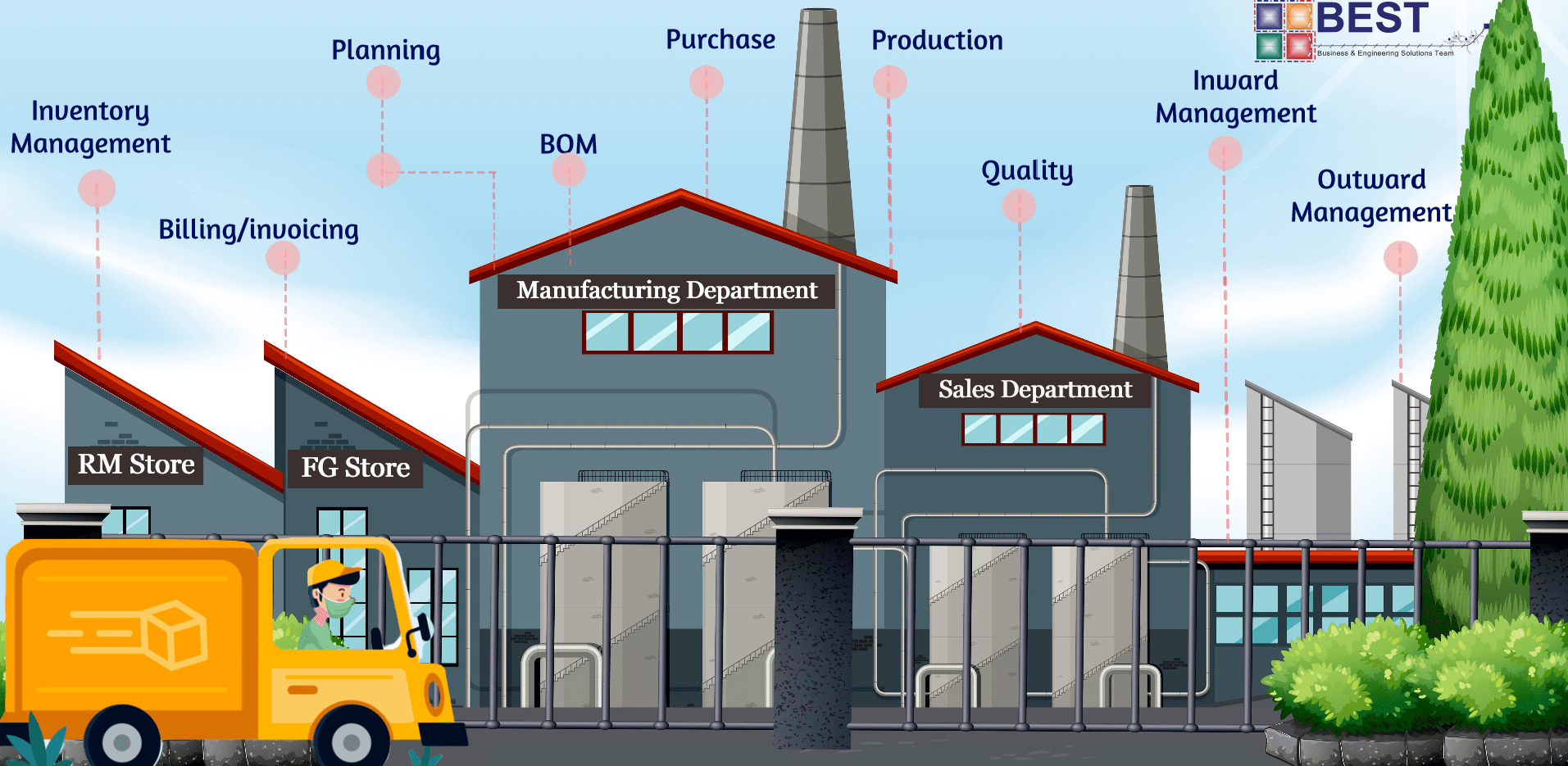
Bestbiz Ingenious Suite (BIS-ERP) || BIZO V3.0
We offer affordable Enterprise Resource Planning software Bestbiz Ingenious Suite for Small and Medium Enterprises designed and developed by technical and functional experts from Industries. Our BIS ERP encompasses entire Business cycle in single database to provide seamless integration across departments. BIS ERP can be customized for Original Equipment Manufacturer (OEM) supply, Fast Moving Consumer Goods (FMCG) as well as for Trading Business with focus on implementation, training and support.

What is ERP?
Enterprise resource planning is the integrated management of main business processes, often in real time and mediated by software and technology.
Modules
Sales & Distribution Management
Sales queries & inquiry analysis & handling, quotation drafting, accepting sales orders, drafting sales invoices with proper taxation, dispatch/Shipment of material or service, tracking pending sales order. All these sales transactions are managed by the sales module of ERP.
Material Management
As the name indicates, Material modules take care of all the processes that are part of the procurement of items or raw materials that are required for the organization. Material module consists of functionalities like supplier/vendor listing, supplier & item linking, sending quotation request to vendors, receiving & recording quotations, analysis of quotations, preparing purchase orders, tracking the Material items, preparing GRNs(Good Receipt Notes) & updating stocks & various reports. Material module is integrated with Inventory module & Engineering/production module for updating of stocks.
Manufacturing Management
The manufacturing module is an automated solution that monitors the day-to-day production activities. Some vital functionalities include shop floor control, plant maintenance, distribution planning, and materials sourcing. Harnessing the power of ERP systems greatly reduces extra costs associated with manufacturing by enhancing operational efficiency and task flow management.
Material Requirement Planning
Automating your manufacturing process including, production planning and control, bill of materials, range, machinery and labour management, production order, work order, stock management and production alerts and exception handling, the module offers you a flexible and an effective solution to reduce the complexity of your MRP process
Quality
This functionality helps in determining sample sizes and adoption of Statistical Quality Control (SQC) techniques. The controlling tools such as quality control charts, quality scores for inspection lots, are part of this process. This procedure also helps in generating quality notifications for external and internal problems and initiating corrective action. The inspection results are also archived for future analysis through this process.
Subcontracting In
Production module treats subcontracting as buying an operation. Therefore, a purchase order must be created when subcontracting is carried out. For generating a subcontracting order, the order status of the operations must be Released or Active. After generation, subcontracting orders are processed in the Purchase module and a purchase-order line is created for each subcontracted operation.
Subcontracting Out
This procedure is used for unplanned subcontracting where operation is shifted to a subcontractor’s workstation due to emergency. This step is not needed for planned subcontracting, as the operation is already planned in a subcontractor’s work center in the routing of the item to be manufactured.
Payroll
The basic function of this component is to generate pay checks periodically, produce related reports and posting to relevant financial ledgers. Attendance records of the employees are entered in the system (often through an access control system). The system provides facility to record overtime data and generate reports involving leave, attendance and absenteeism.
Finance Management
Financial management helps to manage all cash inflows and outflows. It covers all the regular financial and accounting functions such as ledger management, balance sheets, expenditures, and bank reconciliation. One of the most essential functions of the financial management modules to handle taxation and ensure that it is in accordance with current government regulations.